Welcome to Issue 33 of the SUPERIOR BOOK PRODUCTIONS newsletter!
For our readers, as always, there are several great new books listed below that range from being inspiring to controversial, and practical to entertaining. Don't miss them.
For our authors who read the newsletter, it's almost spring—time to get busy planning how you will promote your book as the busiest book selling times of year arrive—summer and the holidays. I know spring is just arriving, but it's never too early to start arranging book signings for the holidays—be they at Christmas, the Fourth of July, or earlier. How might you effectively market your book as an appropriate gift for Easter, Mother's Day, or Father's Day? How can you get the attention of summer tourists? What events can you attend, from craft shows to conferences to creating your own event. Begin your planning early. What holidays best fit your book? What national day or week or month do you need to capitalize on? The time is now to promote your book.
Good luck!
Tyler R. Tichelaar
|
New Books |
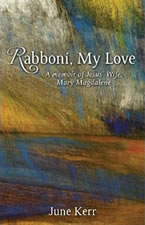 For years, people have speculated about Mary Magdalene and her role in Jesus' life. While many scholars and enthusiasts have argued that she could have been Jesus' wife, such theories have been dismissed and even suppressed by the orthodox Christian establishment. But author June Kerr begs to differ with them. In her daring new novel Rabboni, My Love, Kerr envisions Jesus and Mary Magdalene as husband and wife and parents, and as partners in Jesus' ministry. For years, people have speculated about Mary Magdalene and her role in Jesus' life. While many scholars and enthusiasts have argued that she could have been Jesus' wife, such theories have been dismissed and even suppressed by the orthodox Christian establishment. But author June Kerr begs to differ with them. In her daring new novel Rabboni, My Love, Kerr envisions Jesus and Mary Magdalene as husband and wife and parents, and as partners in Jesus' ministry.
Not every reader will agree with this novel, but Kerr makes arguments by writing fiction that bring the logic of her conviction that Jesus was married to us through a surprisingly strong and moving depiction of the couple.
To read more, visit Rabboni, My Love.
|
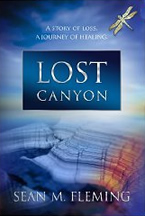 Lost Canyon's title has a double meaning, referring both to a favorite place the author visited as a child and to his son, Canyon, who died. The double meaning provides a beautiful metaphor about treasuring the past and trying to go home again, while having to live in the present, and move forward with life. Sean Fleming lost his son to a gun accident, or what may have been suicide. The author does not have the answers to why his son died. He did not see any warning signs, and there was no suicide note, no explanation given for why his son left him, by choice or not. In this book, Fleming chronicles his journey through grief, acknowledging that time heals, but also that his son will always be a presence in his life. A beautiful book for anyone trying to deal with grief. Lost Canyon's title has a double meaning, referring both to a favorite place the author visited as a child and to his son, Canyon, who died. The double meaning provides a beautiful metaphor about treasuring the past and trying to go home again, while having to live in the present, and move forward with life. Sean Fleming lost his son to a gun accident, or what may have been suicide. The author does not have the answers to why his son died. He did not see any warning signs, and there was no suicide note, no explanation given for why his son left him, by choice or not. In this book, Fleming chronicles his journey through grief, acknowledging that time heals, but also that his son will always be a presence in his life. A beautiful book for anyone trying to deal with grief.
To read more, visit Lost Canyon.
|
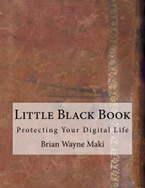 Brian Maki’s Little Black Book offers a common sense approach to dealing with the difficulties that technology has introduced into our lives. As a computer instructor and consultant for more than twenty years, Maki has seen how technology has made rapid changes in our lives to the point where we are addicted to being “connected” constantly, feel a lack of patience when we aren’t connected, and have been bombarded with spam email, computer frustrations, and worst of all, the threat of identity theft. Brian Maki’s Little Black Book offers a common sense approach to dealing with the difficulties that technology has introduced into our lives. As a computer instructor and consultant for more than twenty years, Maki has seen how technology has made rapid changes in our lives to the point where we are addicted to being “connected” constantly, feel a lack of patience when we aren’t connected, and have been bombarded with spam email, computer frustrations, and worst of all, the threat of identity theft.
To read more, visit Little Black Book.
|
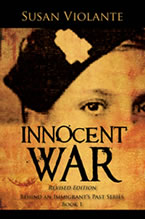 Susan Violante’s Innocent War is a surprising look at World War II from the perspective of a young Italian boy growing up in Libya and Sicily, a boy who happens to be the author’s father. Violante has written this novel based on recordings made by her father about his life, recordings that surprised her and made her see her father in a new way. And she found her father’s story so interesting that she decided to share it with others, as she states in the Foreword: “I wrote a book to get to know my father, and in the process I got to know myself. This didn’t come without hardship, loneliness, disappointment, and frustration as I set myself to break the circle of silence between parents and their sons and daughters.” Violante has dedicated the book to “my parents and to those who, during their childhood, were cheated, lied to, and cowardly abused by those who promote false ideals; and that once they had discovered the truth were able to react and learn to build a new life.” Susan Violante’s Innocent War is a surprising look at World War II from the perspective of a young Italian boy growing up in Libya and Sicily, a boy who happens to be the author’s father. Violante has written this novel based on recordings made by her father about his life, recordings that surprised her and made her see her father in a new way. And she found her father’s story so interesting that she decided to share it with others, as she states in the Foreword: “I wrote a book to get to know my father, and in the process I got to know myself. This didn’t come without hardship, loneliness, disappointment, and frustration as I set myself to break the circle of silence between parents and their sons and daughters.” Violante has dedicated the book to “my parents and to those who, during their childhood, were cheated, lied to, and cowardly abused by those who promote false ideals; and that once they had discovered the truth were able to react and learn to build a new life.”
To read more, visit Innocent War.
|
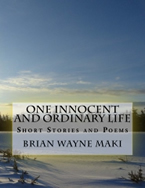 Despite being a computer instructor, Brian Wayne Maki believes that technology has its place and should not intrude into all areas of our lives. In One Innocent & Ordinary Life, he recalls special moments from his childhood and young adult years from playing basketball to building forts and moments with his parents, none of which refer to computers or the digital life. Despite being a computer instructor, Brian Wayne Maki believes that technology has its place and should not intrude into all areas of our lives. In One Innocent & Ordinary Life, he recalls special moments from his childhood and young adult years from playing basketball to building forts and moments with his parents, none of which refer to computers or the digital life.
Maki highlights a certain innocence that has been lost in the last twenty years which coincides with his own loss of childhood, the loss of his father, and the intrusion of technology. But while many of Maki's poems are nostalgic, they are never really sad. Many are very hopeful and they focus on happy experiences, moments of insight, and lessons learned.
To read more, visit One Innocent & Ordinary Life.
|
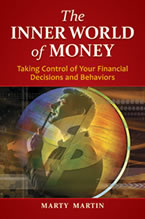 Marty Martin's The Inner World of Money is really a look at the inner world of people and their relationships with and beliefs about money. Rather than being a book about how to invest with explanations of stocks, bonds, and mutual funds, it explores the real role of money in our lives, the reasons for the roadblocks people create by being financially irresponsible, and whether money really can bring happiness. Ultimately, Martin shows readers that money has its place in our lives, a place we should not exaggerate, nor underestimate. We must not look to it for happiness, but we do need to be financially responsible, prepare for retirement, and understand the consequences when we do not. Marty Martin's The Inner World of Money is really a look at the inner world of people and their relationships with and beliefs about money. Rather than being a book about how to invest with explanations of stocks, bonds, and mutual funds, it explores the real role of money in our lives, the reasons for the roadblocks people create by being financially irresponsible, and whether money really can bring happiness. Ultimately, Martin shows readers that money has its place in our lives, a place we should not exaggerate, nor underestimate. We must not look to it for happiness, but we do need to be financially responsible, prepare for retirement, and understand the consequences when we do not.
To read more, visit The Inner World of Money.
|

 For years, people have speculated about Mary Magdalene and her role in Jesus' life. While many scholars and enthusiasts have argued that she could have been Jesus' wife, such theories have been dismissed and even suppressed by the orthodox Christian establishment. But author June Kerr begs to differ with them. In her daring new novel Rabboni, My Love, Kerr envisions Jesus and Mary Magdalene as husband and wife and parents, and as partners in Jesus' ministry.
For years, people have speculated about Mary Magdalene and her role in Jesus' life. While many scholars and enthusiasts have argued that she could have been Jesus' wife, such theories have been dismissed and even suppressed by the orthodox Christian establishment. But author June Kerr begs to differ with them. In her daring new novel Rabboni, My Love, Kerr envisions Jesus and Mary Magdalene as husband and wife and parents, and as partners in Jesus' ministry. Lost Canyon's title has a double meaning, referring both to a favorite place the author visited as a child and to his son, Canyon, who died. The double meaning provides a beautiful metaphor about treasuring the past and trying to go home again, while having to live in the present, and move forward with life. Sean Fleming lost his son to a gun accident, or what may have been suicide. The author does not have the answers to why his son died. He did not see any warning signs, and there was no suicide note, no explanation given for why his son left him, by choice or not. In this book, Fleming chronicles his journey through grief, acknowledging that time heals, but also that his son will always be a presence in his life. A beautiful book for anyone trying to deal with grief.
Lost Canyon's title has a double meaning, referring both to a favorite place the author visited as a child and to his son, Canyon, who died. The double meaning provides a beautiful metaphor about treasuring the past and trying to go home again, while having to live in the present, and move forward with life. Sean Fleming lost his son to a gun accident, or what may have been suicide. The author does not have the answers to why his son died. He did not see any warning signs, and there was no suicide note, no explanation given for why his son left him, by choice or not. In this book, Fleming chronicles his journey through grief, acknowledging that time heals, but also that his son will always be a presence in his life. A beautiful book for anyone trying to deal with grief. Brian Maki’s Little Black Book offers a common sense approach to dealing with the difficulties that technology has introduced into our lives. As a computer instructor and consultant for more than twenty years, Maki has seen how technology has made rapid changes in our lives to the point where we are addicted to being “connected” constantly, feel a lack of patience when we aren’t connected, and have been bombarded with spam email, computer frustrations, and worst of all, the threat of identity theft.
Brian Maki’s Little Black Book offers a common sense approach to dealing with the difficulties that technology has introduced into our lives. As a computer instructor and consultant for more than twenty years, Maki has seen how technology has made rapid changes in our lives to the point where we are addicted to being “connected” constantly, feel a lack of patience when we aren’t connected, and have been bombarded with spam email, computer frustrations, and worst of all, the threat of identity theft. Susan Violante’s Innocent War is a surprising look at World War II from the perspective of a young Italian boy growing up in Libya and Sicily, a boy who happens to be the author’s father. Violante has written this novel based on recordings made by her father about his life, recordings that surprised her and made her see her father in a new way. And she found her father’s story so interesting that she decided to share it with others, as she states in the Foreword: “I wrote a book to get to know my father, and in the process I got to know myself. This didn’t come without hardship, loneliness, disappointment, and frustration as I set myself to break the circle of silence between parents and their sons and daughters.” Violante has dedicated the book to “my parents and to those who, during their childhood, were cheated, lied to, and cowardly abused by those who promote false ideals; and that once they had discovered the truth were able to react and learn to build a new life.”
Susan Violante’s Innocent War is a surprising look at World War II from the perspective of a young Italian boy growing up in Libya and Sicily, a boy who happens to be the author’s father. Violante has written this novel based on recordings made by her father about his life, recordings that surprised her and made her see her father in a new way. And she found her father’s story so interesting that she decided to share it with others, as she states in the Foreword: “I wrote a book to get to know my father, and in the process I got to know myself. This didn’t come without hardship, loneliness, disappointment, and frustration as I set myself to break the circle of silence between parents and their sons and daughters.” Violante has dedicated the book to “my parents and to those who, during their childhood, were cheated, lied to, and cowardly abused by those who promote false ideals; and that once they had discovered the truth were able to react and learn to build a new life.” Despite being a computer instructor, Brian Wayne Maki believes that technology has its place and should not intrude into all areas of our lives. In One Innocent & Ordinary Life, he recalls special moments from his childhood and young adult years from playing basketball to building forts and moments with his parents, none of which refer to computers or the digital life.
Despite being a computer instructor, Brian Wayne Maki believes that technology has its place and should not intrude into all areas of our lives. In One Innocent & Ordinary Life, he recalls special moments from his childhood and young adult years from playing basketball to building forts and moments with his parents, none of which refer to computers or the digital life. Marty Martin's The Inner World of Money is really a look at the inner world of people and their relationships with and beliefs about money. Rather than being a book about how to invest with explanations of stocks, bonds, and mutual funds, it explores the real role of money in our lives, the reasons for the roadblocks people create by being financially irresponsible, and whether money really can bring happiness. Ultimately, Martin shows readers that money has its place in our lives, a place we should not exaggerate, nor underestimate. We must not look to it for happiness, but we do need to be financially responsible, prepare for retirement, and understand the consequences when we do not.
Marty Martin's The Inner World of Money is really a look at the inner world of people and their relationships with and beliefs about money. Rather than being a book about how to invest with explanations of stocks, bonds, and mutual funds, it explores the real role of money in our lives, the reasons for the roadblocks people create by being financially irresponsible, and whether money really can bring happiness. Ultimately, Martin shows readers that money has its place in our lives, a place we should not exaggerate, nor underestimate. We must not look to it for happiness, but we do need to be financially responsible, prepare for retirement, and understand the consequences when we do not.